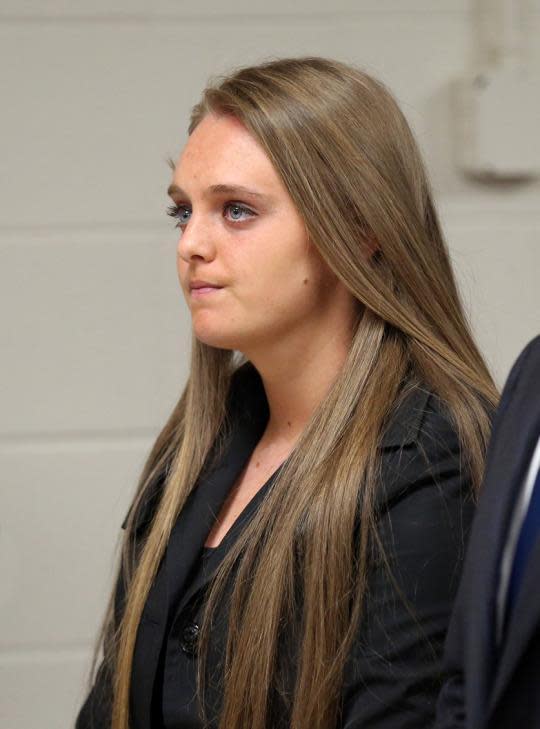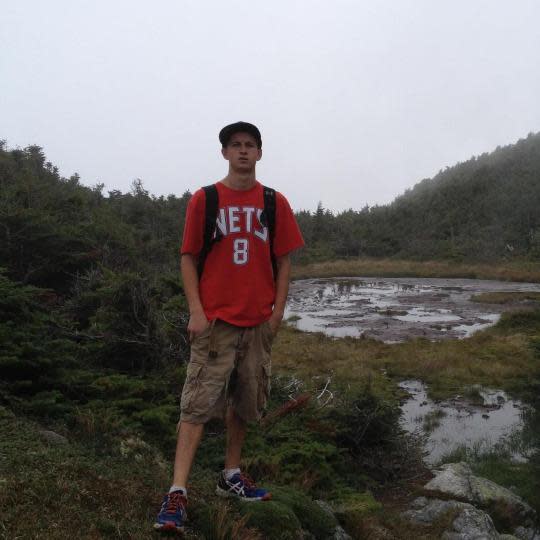Teen's Texts Urging Boyfriend to Commit Suicide Show the Devastating Effect of Peer Pressure

For encouraging her late boyfriend to take his own life, with a barrage of forceful texts including, “You can’t think about it. You just have to do it,” 18-year-old Michelle Carter faces manslaughter charges. (Photo: AP Photo)
Eighteen-year-old Michelle Carter is looking at charges of manslaughter in Massachusetts’s juvenile court because of the way she “strongly influenced” her boyfriend, Conrad Roy, to commit suicide on July 12, 2014, according to the Bristol, Mass., District Attorney’s office. And in Carter’s indictment, released on Friday, prosecutors revealed hundreds of the text messages between the couple during the week before Roy took his life that they say show how she pressured him to do it.
STORY: Parents ‘In Denial’ About Teens’ Depression and Anxiety
“You’re finally going to be happy in heaven. No more pain,” she wrote the high school graduate from Fairhaven, Mass. (who died from carbon monoxide poisoning while sitting in his truck in a Kmart parking lot), in one message. “It’s okay to be scared and it’s normal. I mean, you’re about to die.”
STORY: Mom Opens Up About Daughter’s Suicide: ‘I Didn’t Know My Child’

Conrad Roy (Photo: Facebook/Remembering Conrad Roy)
Carter — whom prosecutors contend lied to police and family about where Roy was while he was committing suicide, and whom they say asked Roy to delete her messages — even texted another friend about her fear that her role in his death would be discovered. “[If the police] read my messages with him I’m done,” she texted. “His family will hate me and I can go to jail.”
Yet it’s evident that she played a role in his demise from the peer pressure she exerted on her depressed boyfriend of two years throughout their correspondence. “You always say you’re gonna do it, but you never do,” the Plainville teen griped at one point about Roy’s hesitance to commit suicide. “I just want to make sure tonight is the real thing.” In another instance she goaded him: “You can’t keep pushing it off, though. That’s all you keep doing.” Carter also urged the teen, who’d previously attempted suicide, “You can’t think about it. You just have to do it.”
Taking an active role in encouraging him, she offered alternatives to carbon monoxide poisoning (“Hanging is painless and take like a second if you do it right”) and gloated about the tragedy (she told a friend, “I’m thankful that our last words were I love you” — the day before his death). “There isn’t anything anyone can do to save you, not even yourself,” she messaged Roy at one point.
“Peer pressure can lead people to make choices they wouldn’t normally make,” psychoanalyst Amy Morin tells Yahoo Parenting. “Hearing someone constantly challenge you to do something can change the way you think and ultimately, change the way you behave.”
That influence is particularly powerful on teenagers. “They aren’t yet secure in who they are as people,” adds Morin, author of 13 Things Mentally Strong People Don’t Do. “They are developing their identities and searching for who they are, all while they want to be independent from their parents and they want to fit in with their peers.”
Yet friends’ influence begins well before the teen years — “as soon as children start to pay attention to what other children think about them,” psychologist Brett Laursen, whose research focuses on kids’ peer interaction, reported in an interview for the American Psychological Association. “We see this as early as first grade.” On the plus side, Laursen noted, “Parents can serve as a buffer against peer influence. We know that children who have good relations with their parents feel that they have less of a need to please their friends.”
Ongoing chats about the dangers of peer pressure is what really helps kids of all ages, adds Morin, who suggests that parents “give children and teens the skills they need to resist such pressure: Assertiveness, problem-solving, and emotion-regulation. These skills can help teens make healthy choices for themselves.”
It’s also a good idea, clinical psychologist Michelle P. Maidenberg tells Yahoo Parenting, for parents to make it clear to kids that everyone deals with peer pressure throughout their life. “This prepares them for what they’ll face when it comes up for them,” she says, noting that in Roy’s case, Carter was likely successful in influencing him so powerfully because she knew that the depressed teen was particularly vulnerable. “It helps kids to recognize that what they’re feeling is normal and that they’re having the conflict that everyone has.”
Moms and dads can’t completely insulate their kids from peer pressure, acknowledges Maidenberg. “The only thing parents really can do to help their kids is to teach them how to handle themselves, because peer pressure is around everything that they do.”
Please follow @YahooParenting on Facebook, Twitter, Instagram, and Pinterest. Have an interesting story to share about your family? Email us at YParenting (at) Yahoo.com.

